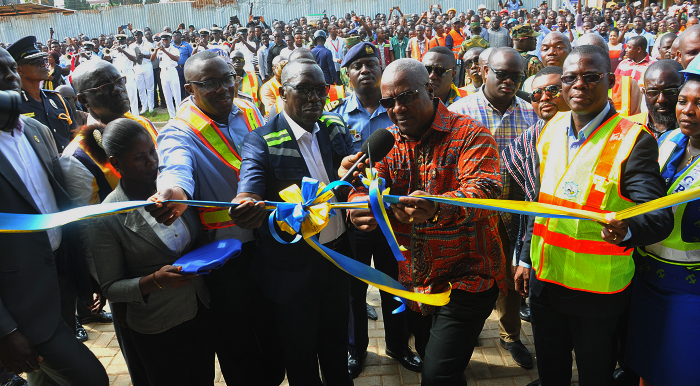
GPHA expansion project commendable, but ...
Over the past few years, the government has systematically expanded and improved facilities at the country’s ports to take in more freight and make transactions less cumbersome and transparent.
Ultimately, the expansion has been geared towards attracting more clients, especially importers and exporters in the land-locked countries in the sub-region, and also improving on the processes for revenue generation at the ports.
It was in the same spirit that President John Mahama last Thursday inaugurated six new projects at the Tema Port and called on stakeholders in the maritime industry to support the implementation of the national single window project to ensure that fees and charges at the country’s ports were rationalised to reduce the payment of multiple fees and charges.
Rightly, President Mahama said the ability of the Tema Port to handle more cargo to make it the most competitive port along the African coast would stem from the availability of efficient services.
Indeed, the fishing mending wharf, the bulk cargo jetty, Liebherr cranes, new central revenue block, tug boats and the marine craft that were inaugurated and the hospital would boost the activities at the port immeasurably and we commend the government and the Ghana Ports and Harbours Authority (GPHA) management for improving on the facilities at both the main Tema Port and the fishing harbour.
But while the investments in the ports are currently yielding the desired fruits of increased revenue from their operations, we urge the government to also focus its attention on revamping the railway network of the country.
A vibrant rail network is a catalyst, not only for any country, but also for its ports. A good railway system would encourage more importers and exporters to ship goods through the ports rather than air-freight them, which is more expensive.
Currently, although we have neighbouring countries such as Burkina Faso and Mali using our seaports because they are landlocked, they have to depend on the road network, which is not in excellent shape, to transport heavy goods to and from the ports.
Apart from the laborious journey that the articulated truck drivers have to endure every time they move goods to and from the ports, the bad nature of the roads and difficulties they encounter at police and customs barriers make road transport a very big disincentive.
Rail transport is a much better means of transporting heavy goods or merchandise straight from the ports and the hinterlands, without having to go through all the hassles of road travel, which invariably also takes a heavy toll on the roads.
For now the GPHA may be enjoying all the praise because it is raking in so much revenue as a state-owned enterprise (SOE) and has become financially self-sufficient.
While the Daily Graphic does not intend to be a prophet of doom, we wish to stress that the country’s ports stand to lose the revenue being made now, if neighbouring countries, which have ports, develop their rail system and Ghana fails to revamp its rail infrastructure.
We can no more postpone the reactivation of the Ghana Railway Corporation, since it is key to the sustainability of the ports’ vibrancy.
The Daily Graphic, therefore, urges the government to do all in its power not only to bring back rail transport but make it vibrant and able to compete with road transport not only for cargo but passengers too.
